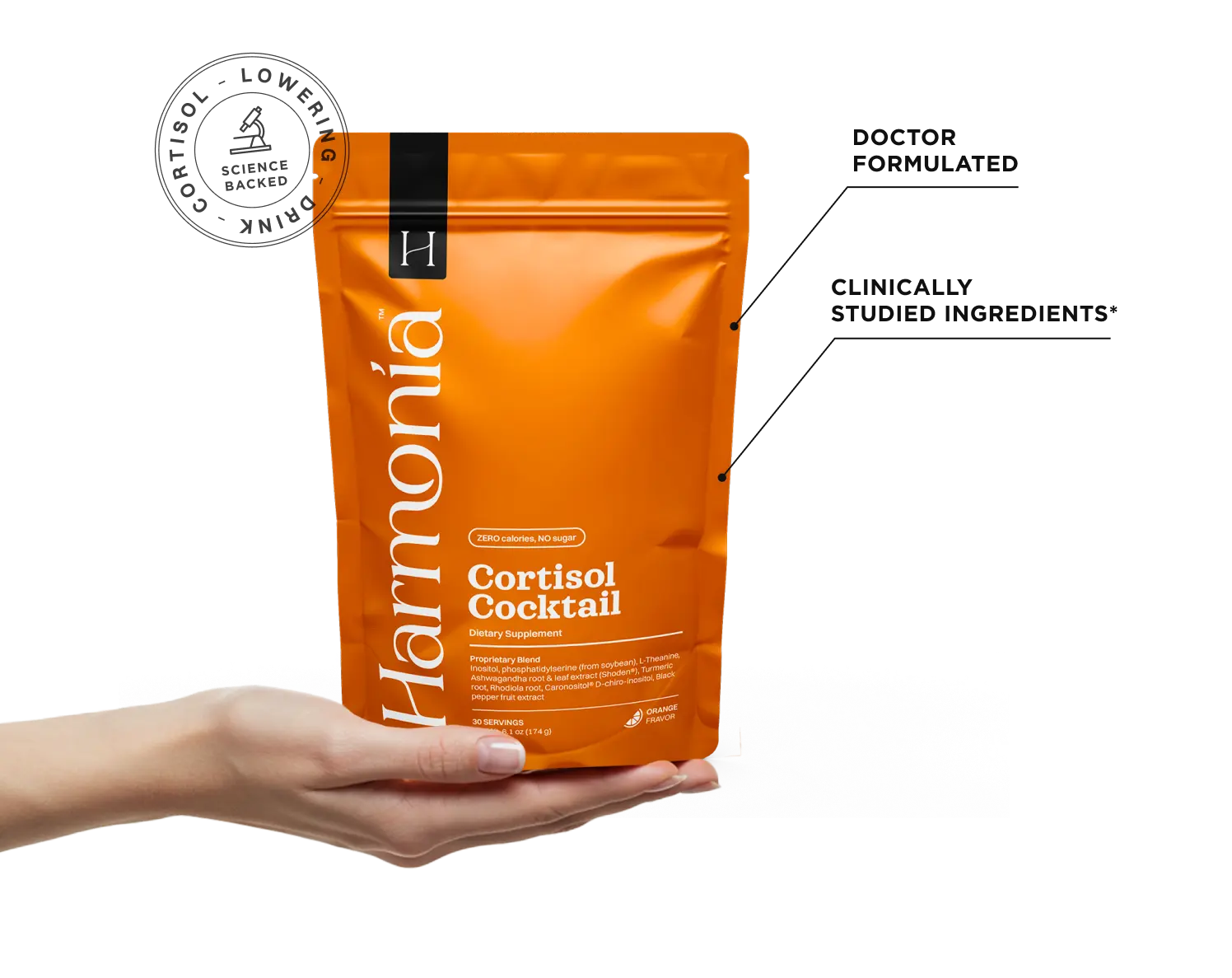In today’s fast-paced world, stress has become the background noise of daily life - and your hormones feel the effects long before you do.
Fatigue, brain fog, weight changes, or mood swings often seem like separate issues, but they share a common root: an imbalance between your cortisol (the stress hormone) and your thyroid hormones, which regulate energy, metabolism, and mood.
When cortisol and thyroid levels fall out of rhythm, your body shifts into survival mode. Energy drops, sleep quality worsens, and even your digestion and skin can change. What’s often overlooked is how deeply connected these two systems are - and how chronic stress can quietly interfere with thyroid health, slowing your metabolism and disrupting your hormones.
Understanding how cortisol and thyroid function together - and how to support them - is the first step toward feeling calm, energized, and hormonally aligned again.
What Are Cortisol and Thyroid Hormones?
Your body runs on a finely tuned hormonal network - and two of its most powerful messengers are cortisol and thyroid hormones. While they perform very different jobs, they constantly communicate to keep your metabolism, mood, and energy in balance.
Cortisol: The Stress-Response Hormone
Cortisol is produced by the adrenal glands, small organs that sit on top of your kidneys. Often called the “stress hormone,” cortisol helps your body respond to physical, emotional, and environmental stress.
But its role goes far beyond stress alone - cortisol:
- Regulates blood sugar to maintain steady energy throughout the day
- Controls inflammation, supporting immune health
- Influences mood and motivation through its effects on brain neurotransmitters
- Affects sleep-wake cycles, helping you feel alert in the morning and relaxed at night
In short, cortisol helps you adapt - but when it stays elevated for too long, it can disrupt other hormones, especially those produced by the thyroid.
Thyroid Hormones: The Metabolic Regulators
Your thyroid gland, a butterfly-shaped organ in the neck, produces hormones that control how every cell in your body uses energy. The main thyroid hormones include:
- TSH (Thyroid-Stimulating Hormone): Produced by the pituitary gland, it tells your thyroid when to release hormones.
- T4 (Thyroxine): The storage form of thyroid hormone.
- T3 (Triiodothyronine): The active form that fuels metabolism, temperature regulation, and brain activity.
Together, these hormones influence metabolism, digestion, mood, cognitive function, and even menstrual health. When thyroid hormones are too low or too high, the effects ripple through the entire body.
How Stress and Cortisol Affect Thyroid Function

Your thyroid and adrenal glands are part of a finely tuned hormonal network known as the HPA (hypothalamic-pituitary-adrenal) and HPT (hypothalamic-pituitary-thyroid) axes. When chronic stress keeps cortisol high for too long, that balance is disrupted.
Here’s how it happens:
- Elevated cortisol suppresses TSH, the hormone that signals your thyroid to produce T3 and T4.
- It can also reduce the conversion of T4 into active T3, slowing down metabolism.
- Fatigue, slower digestion, and weight gain are often labeled as “thyroid-related,” but heavily influenced by cortisol levels.
This is why many women with stress-related issues notice symptoms that mimic thyroid dysfunction - even when their lab results are “normal.” Chronic stress doesn’t just exhaust your mind; it alters your hormones from the inside out.
Hypothyroidism, Hyperthyroidism, and Cortisol: A Two-Way Relationship
The relationship between cortisol and thyroid hormones is not a one-way street - it’s a continuous feedback loop. When one becomes imbalanced, the other is often affected.
This is why many people experiencing thyroid dysfunction also struggle with stress-related symptoms like fatigue, anxiety, and poor sleep.
Understanding how cortisol interacts differently in hypothyroidism and hyperthyroidism can help you identify the root cause of your hormonal imbalance.
1. Hypothyroidism and Cortisol
When your thyroid slows down - a condition known as hypothyroidism - your metabolism, digestion, and energy production all decrease. The body perceives this slowdown as stress and responds by releasing more cortisol to maintain stability.
Over time, this constant “stress signal” can cause elevated cortisol levels, as the body tries to compensate for reduced thyroid function. High cortisol, in turn, can further suppress TSH (thyroid-stimulating hormone) and reduce the conversion of T4 into active T3, deepening the sluggishness.
This cycle creates a frustrating hormonal tug-of-war that can leave you feeling tired but wired, mentally foggy, puffy, and prone to weight gain despite healthy habits. Addressing both cortisol and thyroid balance - rather than focusing on one alone - is often the key to lasting improvement.
2. Hyperthyroidism and Cortisol
On the opposite end, when the thyroid becomes overactive - as in hyperthyroidism - metabolism speeds up dramatically. This increase in metabolic demand causes the body to use up cortisol more quickly, sometimes leading to cortisol depletion.
Low cortisol levels can amplify symptoms of hyperthyroidism such as anxiety, restlessness, irritability, and sleep disturbances. The body essentially runs on overdrive, with insufficient cortisol to regulate inflammation and energy balance.
Research shows that both high and low thyroid activity can disrupt cortisol production, making stress management an essential part of thyroid care.
Supporting adrenal health - through rest, nutrition, adaptogenic herbs, and lifestyle balance - helps stabilize both systems and promotes long-term hormonal harmony.
Symptoms of Cortisol-Thyroid Imbalance

When cortisol and thyroid hormones are out of balance, symptoms often overlap - making it hard to know which system is struggling first. Common signs include:
- Persistent fatigue, no matter how much you sleep
- Cortisol thyroid weight gain or unexplained weight loss
- Anxiety, irritability, or mood swings
- Insomnia or restless sleep
- Cold intolerance or hot flashes
- Brain fog and forgetfulness
- Irregular menstrual cycles or worsened PMS
If several of these sound familiar, it’s time to look deeper into your thyroid and cortisol levels.
How to Support Cortisol and Thyroid Balance Naturally
Balancing cortisol and thyroid hormones isn’t about quick fixes — it’s about helping your body return to its natural rhythm. These hormones respond to how you eat, sleep, move, and manage stress.
When one system becomes overworked, the other struggles to keep up, which is why a holistic approach that supports both your adrenals and thyroid is key to lasting balance.
Below are proven ways to help restore harmony naturally.
1. Prioritize Rest and Quality Sleep
Your body repairs, rebalances, and lowers cortisol levels while you sleep. Even a few nights of poor rest can spike cortisol and slow thyroid recovery.
- Aim for 7-9 hours of deep, consistent sleep each night.
- Keep a relaxing bedtime routine and avoid blue light an hour before bed.
- Magnesium, L-theanine, and adaptogenic herbs - all found in Harmonia’s Cortisol Blend - can promote deeper relaxation and better sleep quality naturally.
2. Nourish Your Body with Balanced Nutrition
Both cortisol and thyroid hormones depend on proper nutrition to function well.
- Include high-quality proteins (such as eggs, lentils, or fish) to provide amino acids that support thyroid hormone production.
- Choose anti-inflammatory fats like avocado, olive oil, and omega-3s to calm the adrenals.
- Avoid skipping meals or relying on caffeine for energy - both raise cortisol and can slow thyroid output.
3. Move Mindfully
Movement is medicine - but balance is everything. Exercise helps regulate cortisol and supports a healthy metabolism, yet too much intensity can deplete energy and strain the thyroid.
- Focus on moderate movement such as walking, yoga, or strength training.
- Schedule rest days to allow your hormones to reset.
- Listen to your body’s cues rather than pushing through exhaustion - sustainable energy, not burnout, is the goal.
4. Practice Daily Stress Regulation

Your nervous system dictates how much cortisol you produce. Supporting it daily helps protect thyroid function.
- Incorporate mindfulness, meditation, or breathwork to lower stress hormones in real time.
- Journaling or gratitude reflection can calm emotional stress.
- Get regular sunlight and time in nature to balance your circadian rhythm.
5. Support Hormone Health with Targeted Nutrients
While lifestyle changes are foundational, many women benefit from extra nutritional support to manage cortisol and maintain thyroid balance.
- Adaptogens like Ashwagandha and Rhodiola Rosea reduce stress reactivity and enhance energy resilience.
- Inositols (Myo & D-Chiro) help balance insulin and reproductive hormones, often disrupted by cortisol imbalance.
- Phosphatidylserine supports brain clarity and emotional stability.
- Turmeric and Black Pepper Extract help reduce inflammation and promote healthy metabolism.
All of these research-backed ingredients - and more - are thoughtfully combined in Harmonia’s Cortisol Cocktail, created to help women lower stress, sleep better, and restore hormonal balance from the inside out.
The Harmonia Solution
When stress takes over, your hormones can’t function as they should - but the body has an incredible ability to recover when given the right support.
Harmonia Cortisol Cocktail was created with that purpose in mind: to help women naturally calm their stress response, restore hormonal balance, and feel like themselves again.
Formulated for women navigating high cortisol, thyroid imbalances, PCOS, or menopause, Harmonia helps bring your body back into rhythm. With consistent use, many women notice calmer moods, steadier energy, and deeper, more restorative sleep.
It’s not about masking symptoms - it’s about addressing the underlying stress imbalance that disrupts your thyroid and overall well-being.
Thousands of women across the country have shared how Harmonia has transformed their daily lives. Every sip supports the gentle rebalancing of your adrenals, thyroid, and nervous system, so you can wake up refreshed, focused, and at peace.
Harmonia makes hormone health simple - and delicious. It’s a daily ritual that supports relaxation, resilience, and the steady energy your body was designed to have.
References
- Petrowski, K., & Kahaly, G. J. (2025). Stress & Thyroid Function–From Bench to Bedside. Endocrine Reviews, bnaf015. Link.







